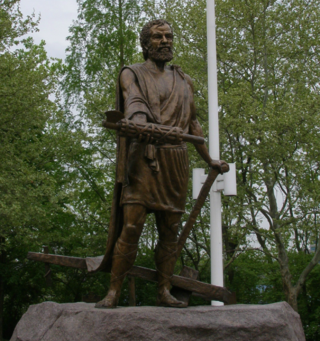Related Research Articles

Lucius Quinctius Cincinnatus was a Roman patrician,statesman,and military leader of the early Roman Republic who became a legendary figure of Roman virtue—particularly civic virtue—by the time of the late Republic.

The gens Valeria was a patrician family at ancient Rome,prominent from the very beginning of the Republic to the latest period of the Empire. Publius Valerius Poplicola was one of the consuls in 509 BC,the year that saw the overthrow of the Tarquins,and the members of his family were among the most celebrated statesmen and generals at the beginning of the Republic. Over the next ten centuries,few gentes produced as many distinguished men,and at every period the name of Valerius was constantly to be found in the lists of annual magistrates,and held in the highest honour. Several of the emperors claimed descent from the Valerii,whose name they bore as part of their official nomenclature.

Publius Valerius Poplicola or Publicola was one of four Roman aristocrats who led the overthrow of the monarchy,and became a Roman consul,the colleague of Lucius Junius Brutus in 509 BC,traditionally considered the first year of the Roman Republic.

Aulus Postumius Albus Regillensis was an ancient Roman who,according to Livy,was Roman dictator in 498 or 496 BC,when he conquered the Latins in the great Battle of Lake Regillus and subsequently celebrated a triumph. Many of the coins of the Postumii Albi commemorate this victory of their ancestor,as in the one pictured. Roman folklore related that Castor and Pollux were seen fighting in this battle on the side of the Romans,whence the dictator afterwards promised a temple to Castor and Pollux in the Roman Forum.
Aulus Postumius Albus Regillensis was a patrician politician of ancient Rome,and apparently son of Aulus Postumius Albus Regillensis,and therefore brother of Spurius Postumius Albus Regillensis. He,or possibly his brother Spurius,was appointed to dedicate the Temple of Castor in 484 BC as duumviri aedi dedicandae.
Spurius Larcius was one of the leading men of the early Roman Republic,of which he was twice consul. However,his greatest fame was won as one of the defenders of the Sublician bridge against the army of Lars Porsena,the King of Clusium.

The gens Horatia was a patrician family at ancient Rome. In legend,the gens dates back to the time of Tullus Hostilius,the third King of Rome. One of its members,Marcus Horatius Pulvillus,was consul suffectus in 509 BC,the first year of the Republic,and again in 507. The most famous of the Horatii was his nephew,Publius Horatius Cocles,who held the Sublician bridge against the army of Lars Porsena circa 508 BC.

The gens Lucretia was a prominent family of the Roman Republic. Originally patrician,the gens later included a number of plebeian families. The Lucretii were one of the most ancient gentes,and the second wife of Numa Pompilius,the second King of Rome,was named Lucretia. The first of the Lucretii to obtain the consulship was Spurius Lucretius Tricipitinus in 509 BC,the first year of the Republic.
The gens Villia was a plebeian family at Rome. Its members are mentioned in the first century of the Republic,but the only Villius who obtained the consulship was Publius Villius Tappulus,in BC 199.
Servius Sulpicius Camerinus Cornutus was a Roman politician in the 5th century BC,consul in 461 BC and decemvir in 451 BC.
Titus Veturius Geminus Cicurinus was a Roman politician of the 5th century BC,consul in 462 BC and maybe decemvir in 451 BC.
Publius Curiatius Fistus Trigeminus was a Roman politician in the 5th century BC,consul in 453 BC,and decemvir in 451 BC.
Publius Valerius Poplicola was consul of the Roman Republic in 475 BC and 460 BC,and interrex in 462 BC.
Aulus Verginius Tricostus Caeliomontanus was a Roman politician active in the fifth century BC and was consul in 469 BC.
Lucius Lucretius Tricipitinus was a Roman senator in the fifth century BC,and was consul with Titus Veturius Geminus Cicurinus in 462 BC.
Servius Cornelius Maluginensis was a politician and general of the Roman Republic. He was elected consular tribune seven times in 386,384,382,380,376,370,and 368 BC. Despite having one of the most successful careers of the Republic,Servius' life is seldom known.
Gaius Valerius Potitus Volusus was a consul in 410 and consular tribune in 415,407 and 404 BC of the Roman Republic.
Lucius Valerius Potitus was a five time consular tribune,in 414,406,403,401 and 398 BC,and two times consul,in 393 and 392 BC,of the Roman Republic.
Publius Valerius Poplicola was a Roman politician and general in the mid 4th century BC who served as Roman Consul,Praetor,Dictator,and Magister Equitum during his career.
Marcus Horatius Turrinus Barbatus was a Roman senator from the early Republic,who served as consul in 449 BC alongside Lucius Valerius Poplicola Potitus. According to Roman historical tradition,he and Valerius played an important role in ending the Decemvirate and bringing harmony between the patrician and plebeian orders. To the two consuls are traditionally attributed the Valerio-Horatian Laws,which gave full force of law to measures passed by plebiscite,restored the right of any citizen to appeal to the people,and confirmed the sacrosanctity of plebeian tribunes. The historicity of these laws has been doubted.